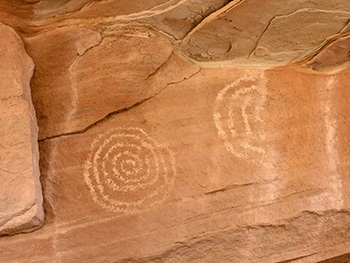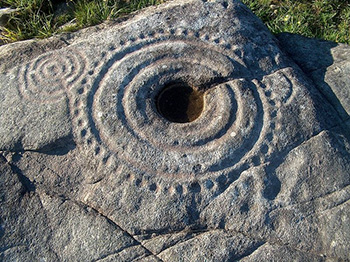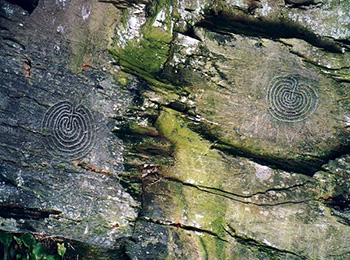From Our Archives
For earlier essays on this week's RCL texts, see Dan Clendenin, Amos: Will the Land Not Tremble? (2022); Debie Thomas, "Only One Thing" (2019); and Dan Clendenin, Amos and Daniel: The Center of the Gospel and the Fringe of Culture (2016), Choosing the Better Part (2013), Amos: From Personal Piety to Social Justice (2010), and Growing Strong By Destroying Others (2007).
This Week's Essay
By Amy Frykholm, who writes the lectionary essay every week for JWJ.
Amos 8:4: “Hear this.”
For Sunday July 20, 2025
Lectionary Readings (Revised Common Lectionary, Year C)
Psalm 52 or Psalm 15
Colossians 1:15–28
Luke 10:38–42
“Worlds end all the time,” Ben Ehrenreich writes in Desert Notebooks: A Road Map for the End of Time. In this book of meditations on climate change, Ehrenreich attempts both to describe landscapes devastated by human activities and also note the mysterious regenerative capacities of the earth itself.
There is an Amos-like quality to Ehrenreich’s meditations. Like the prophet Amos, he sees that the path we are on is not inevitable, and he also observes the cyclical nature of the disasters we are now observing as we live through climate change. Amos says, “Shall not the land tremble on this account, and everyone mourn who lives in it, and all of it rise like the Nile, and be tossed about and sink again, like the Nile of Egypt?” (8:8). Even though Amos is describing chaos, he is also pointing to predictability: one thing certain about the Nile before the 1960s was that it would inundate the river valley and then recede again.
Ehrenreich writes that for decades we’ve been told that we must accept there are no alternatives to this way of living. Even though we know it isn’t sustainable — that the earth will not tolerate our demand for more and more fossil fuels, more and more plastics and pavement — political rhetoric the world over has told us that it is childish and even dangerous to imagine another way. We were told, he says, “that economic growth was limitless and democracy would advance alongside it, and prosperity, equality, freedom, and endless high-tech toys.” Most of us accepted this narrative, and if we didn’t accept it, we still shrugged and went about our business, just as the people did in the time of Amos. “We didn’t see, most of us, that the path we were on would lead us here, into this cul-de-sac. Now the asphalt is melting and falling away beneath our feet,” and we feel the crisis coming. Indeed, it is already here.
As Amos tries to find words for these human-caused calamities, he says, “This is not a famine of bread or a thirst for water” — although without a doubt those things have happened and are happening. But the deeper crisis is a famine of “hearing the words of the Lord” (8:11). That is, it’s a famine of listening.
 |
|
Spiral petroglyphs at Hovenweep National Monument. Photo credit: NPS.
|
Amos was an outsider. He came to Israel from the neighboring land of Judah, and as an outsider he could perhaps better see and interpret what was happening, how the way of life that the people thought was completely normal would destroy them. “Hear this, you who trample on the needy, and bring ruin to the poor of the land, saying, ‘When will the new moon be over so that we may sell grain, and the Sabbath so that we may offer wheat for sale?’”(8:4). He observes the petty and superficial desires of the people to go about their ordinary lives, how eager they are to get on with it.
What Amos sees coming — the disaster perpetuated by the invasion of the Assyrians — is a direct result of the people’s decisions to weaken their society. Business as usual isn’t neutral in their case. It’s a chance to “make the ephah smaller and the shekel heavier,” to “practice deceit with false balances” (8:5). People’s ordinary actions lead up to the disaster that Amos foretells. He sees that this is the anticipated outcome of injustice. Just as the Nile rises up and floods the plain and then recedes again, unjust actions lead to a weakened society. An unjust society is its own worst enemy. It hardly even needs an outside enemy to bring disaster upon its head.
As Ehrenreich observes the same things happening in our own world, he evokes listening as a way forward. He listens to the owls in the Sonoran Desert. He notes that in the folklore of the Sonoran Desert, owls defy linear time. They swoop in arcs; they move backward and forward and in circles. They travel between worlds. He notices that “the desert enforces its own perspective. It shrinks you and puts eternity in the foreground. If you’re open to it, and don’t mind a diminished role in this drama, it insists, quietly, on the surging beauty of all things and non-things living and dead and not-formally-alive.” As we listen to the natural world around us, we may hear alternatives to the apocalyptic narratives that currently dominate political conversation.
 |
|
A Laxe Das Rodas Petroglyph in Muros, Galicia.
|
Ehrenreich sees opportunity for listening not only to the natural world, but also to older stories — “perhaps especially to the ones discarded long ago, and to the ones told by people whose paths collided with that of the society in which we live and who did not make it through that encounter intact.”
In this week’s reading from Luke’s gospel, Jesus tells Martha that the highest calling is listening. In Jewish tradition the deepest part of the soul is called the neshamah, the listening one. Listening is difficult work. It is far more difficult than building things or tearing them down; it is coming into relation with both the earth and with God, attuning ourselves, because when we “run to and fro,” as Amos says, we seek without finding (8:12).
If we think about this moment in the gospel as a portrait of our own souls, then we see the two parts. One part of us is Martha: running around trying to get everything done, pleasing everyone, fixing everything, making money, worrying about money, wanting to be right and good, but also get what we need, even if it is at the expense of others. We are both anxious and determined at the same time, but we are not listening. Another part of us is Mary — that deeper part of ourselves — tuning in for the one thing necessary.
We don’t have a lot of time to do this attunement. Like Amos's basket of summer fruit (8:1), we are already turning toward the rot. But Ehrenreich writes, “Remember that all roads are connected. If we hurry, we could follow almost any route, really any road we want, so long as we pay enough attention along the way.”
 |
|
Tree of Life Petroglyph in Cornwall, England.
|
Worlds end all the time. Biblical prophecy is one constant reminder of this. Our own history is a constant reminder of this. Any small act of archeology can take us into another world whose time stopped. But Amos also peers ahead into yet deeper time and sees restoration, just as inevitable as the calamity that is upon the people now.
As I try to take these teachings into my own life, I sometimes climb the hills just above the river valley that flows between two mountain ranges near where I live. From this place where there are precambrian rocks more than 4.6 billion years old, a vast range of geologic time spreads out in front of me. I can see the rift valley that pushed the two mountain ranges apart and how a once-enormous lake sculpted the valley floor. I can see how water pressed slowly through rock walls to drain that lake and create the river that flows there today.
On a couple of these rocks are also petroglyphs, faint traces left by another people who once traveled through this valley. One of the petroglyphs feels like a message to the future: a spiral. Time moves, but not in a linear direction. Sometimes I sit with my back against this rock, and I try to listen to the person who left this message, and I try to listen to the rock itself — what it can tell me about disaster and renewal, about the past and the future, about the time I am in and the time to come. Sometimes it says to me, like the rock that once spoke to the poet Rainier Maria Rilke, “you must change your life.”
Weekly Prayer
Rainier Maria Rilke (1875-1926)
We cannot know his legendary head
with eyes like ripening fruit. And yet his torso
is still suffused with brilliance from inside,
like a lamp, in which his gaze, now turned to low,gleams in all its power. Otherwise
the curved breast could not dazzle you so, nor could
a smile run through the placid hips and thighs
to that dark center where procreation flared.Otherwise this stone would seem defaced
beneath the translucent cascade of the shoulders
and would not glisten like a wild beast’s fur:would not, from all the borders of itself,
burst like a star: for here there is no place
that does not see you. You must change your life.Rainier Maria Rilke (1875–1926) was an Austrian poet who from a very early age knew that his life was meant for literature, poetry, and writing. A frequent theme of Rilke’s poetry, Annemarie Kidder remarks, "is the human heart's insatiable longing for the transcendent, the divine," which expressed itself in religious proclivities that were decidedly unorthodox. This poem can be found in The Selected Poetry of Rainier Maria Rilke, edited and translated by Stephen Mitchell (Vintage, 1989), p. 61.
Amy Frykholm: amy@journeywithjesus.net
Image credits: (1) National Park Service; (2) Ancient Connection; and (3) The Megalithic Portal.





